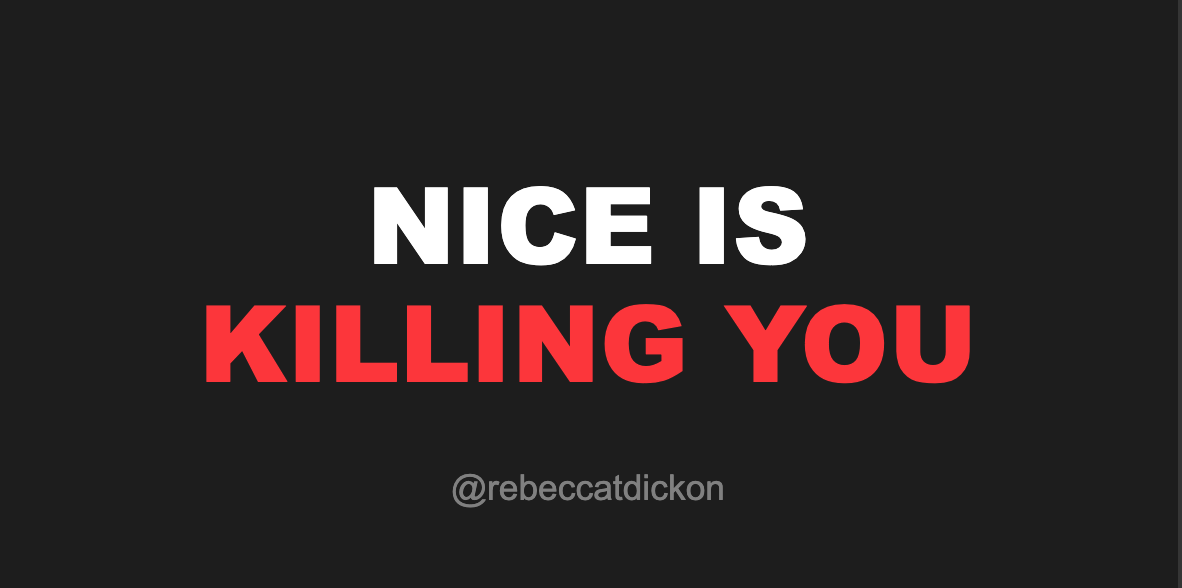Nice girls don’t heal
Nice is what’s killing you. Slowly. Quietly. Like a good girl should.
Nice is swallowing your rage until it turns to acid in your gut.
Nice is slow suicide in sensible shoes.
Nice is what makes you apologize while someone’s stabbing you in the back.
Nice is what has you tone policing your own screams.
Nice is what keeps you bringing casseroles to people who’d watch you drown.
Nice is letting people cross your boundaries because making waves isn’t polite.
Nice is trauma wearing a pretty dress and a fake smile.
Nice is a death sentence with a smile.
Nice is why you’re popping Xanax in the bathroom at work with another panic attack.
Nice is why you’re on your third autoimmune disorder, while your digestive system eats itself alive.
Nice is trauma wearing lipstick, and calling itself love.

And I’m done being nice.
Last week, a woman came to me shaking. Not crying. Not screaming. Shaking.
She’d spent so many years being nice, she forgot how to speak. Her voice was trapped under decades of “good girl” and “be kind” and “don’t make anyone uncomfortable.”
Know what happened when she finally broke? She remembered every single person who told her to be “nice” while they were destroying her. Every. Single. One.
Your shadow remembers too.
- Every time you swallowed your rage and called it peace.
- Every time you froze instead of fought.
- Every time you made yourself smaller, smaller, smaller, until you almost disappeared.
That darkness you keep trying to heal? That’s not darkness. That’s your power breaking through nice’s prison walls
That anger you’re afraid of? It knows where the bodies are buried.
That bitch you keep caging? She knows how to save your life.
Nice girls end up as statistics. In hospitals with mystery illnesses.
In relationships that feel like slow murder.
In therapy groups wondering why being good didn’t protect them.
Our Shadow Integration Workshop is for women who are done dying politely. Done turning their trauma into an inspiring Facebook post. Done pretending their rage isn’t holy.
For two hours, we’re going to descend into your shadow and wake up every not-nice part of you that’s been keeping your truth company.
No spiritual bypassing. No toxic positivity. No more f*cking gold stars for making yourself digestible.
$97 gets you the pre-recorded workshop and workbook. Because this work is as messy as the truth, and you’ll need to witness it more than once.
P.S. They told you “nice” keeps you safe. But nice is what’s keeping you sick, scared, small. Nice is what’s keeping you in therapy trying to heal wounds that need rage, not reflection.
P.P.S. When nice girls snap, they don’t break. They remember. Every slight. Every betrayal. Every time they chose being liked over being alive.
P.P.P.S. Your shadow isn’t dark magic. It’s every truth you buried trying to be nice. And it’s long past time to dig them all up.


 They want real transformation, and if you’re not trauma-informed, you’re missing an opportunity to meet them at that level.
They want real transformation, and if you’re not trauma-informed, you’re missing an opportunity to meet them at that level. The coaching industry is changing fast. More clients are seeking trauma-informed coaches. And more coaches are realizing they need these tools to stay relevant and effective. If you’re ready to stop guessing and start coaching at a deeper level, this certification is your next step.
The coaching industry is changing fast. More clients are seeking trauma-informed coaches. And more coaches are realizing they need these tools to stay relevant and effective. If you’re ready to stop guessing and start coaching at a deeper level, this certification is your next step.